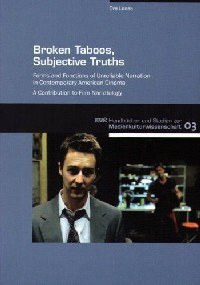Fiktive und 'reale' Welten: Inszenierung und Rezeption unzuverlässigen Erzählens im Hollywood Kino
DOI:
https://doi.org/10.22029/ko.2010.517Abstract
In ihrer englischsprachigen Dissertation, die als dritter Band der von Knut Hickethier und Ansgar Nünning herausgegebenen Reihe "WVT-Handbücher und Studien zur Medienkulturwissenschaft" erschienen ist, untersucht Eva Laass Inszenierung und Rezeption des 'unzuverlässigen Erzählens' am Beispiel ausgewählter populärer Hollywood-Produktionen der letzten zwei Jahrzehnte. Auf der theoretischen Grundlage der kognitiven und intermedialen Narratologie entwickelt die Autorin dazu zunächst eine Typologie, welche dann an Filmen wie u. a. Forrest Gump (1994), Fight Club (1999), The Usual Suspects (1995) und Memento (2000) Anwendung findet und überprüft wird. Im Laufe ihrer Argumentation erweist sich das konsequente Einbeziehen der Rolle des Betrachters als äußerst produktiv. Die Studie schließt mit der sozialen Dimension dieser besonderen Erzählform und ihrer Einordnung in den (hollywoodschen) soziopolitischen Kontext.
Literaturhinweise

Downloads
Veröffentlicht
Ausgabe
Rubrik
Lizenz
Alle Beiträge (nicht die Buchcover) in KULT_online seit der 50. Ausgabe erscheinen unter der Lizenz Creative Commons Namensnennung 4.0. Die veröffentlichten Beiträge dürfen Sie unter den Bedingungen der Lizenz frei nutzen, insbesondere auch für kommerzielle Zwecke und durch Bearbeitung der Beiträge (allgemeinverständliche Fassung). Die Autor_innen von KULT_online haben der Zeitschrift die Veröffentlichung erlaubt und ihre Texte unter einer CC-BY-Lizenz veröffentlicht. Es findet keine exklusive Übertragung von Verwertungsrechten („copyright transfer“) an die Zeitschrift statt. Für die Buchcover gelten die urheberrechtlichen Bestimmungen des Verlages, bitte kontaktieren Sie das Verlagshaus für jede rechtmäßige Weiternutzung. Alle Beiträge der Ausgaben 1-49 sind online frei zugänglich und unterliegen den Nutzungsbeschränkungen gemäß des deutschen Urheberrechts



